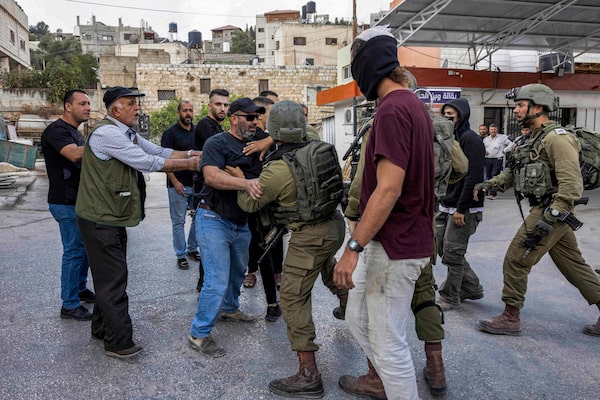
A masked Israeli settler stands by while Palestinians and Israeli soldiers scuffle during clashes in the town of Huwara in the occupied West Bank on Oct. 13.OREN ZIV/AFP/Getty Images
A group of Jewish settlers on Thursday rampaged through a Palestinian town in the northern West Bank, attacking shops and residents with stones and iron bars, according to Palestinian reports and amateur video from the scene. Over 40 Palestinians were reported wounded.
It was the latest violence in the northern West Bank – where the Israeli military has been conducting nightly arrest raids against suspected Palestinian militants.
It was not immediately clear what sparked Thursday’s rampage, but Palestinian militants in the area have carried out several roadside shootings in recent weeks. The area is home to a number of hardline settlements, whose residents often intimidate Palestinians and vandalize their property.
Ghassan Daghlas, a Palestinian official who monitors settlement activities in the area, said some 70 settlers from the hardline settlement of Yitzhar appeared in Hawara, on the outskirts of the city of Nablus, without warning.
He said mobs beat Palestinians, damaged shops and cars and set fire to a city park. He said 22 people were struck by stones, and 20 others were beaten up.
“The Israeli army was doing nothing but protecting them,” he said.
Among those injured was AP photographer Majdi Mohammed, who was struck in the knee and lightly hurt by an Israeli tear gas canister fired by a soldier.
Amateur video from the scene showed young settlers brandishing clubs as they ran through the streets and approached shopkeepers. At one point, a shopkeeper with his back against a wall swung a stick at a group of youths, while a second Palestinian threw a stone at them. Soldiers fired into the air and stood next to a group of settlers, apparently trying to keep the group’s separated.
The Israeli military had no immediate comment.
The incident came hours after Israeli police fired live rounds, tear gas and stun grenades in a seres of confrontations in east Jerusalem, as Palestinians threw stones, firecrackers and firebombs. It was the fiercest unrest in the contested city in months.
Tensions in Israeli-annexed east Jerusalem have been soaring since a Palestinian assailant shot and killed an Israeli soldier at a checkpoint at the entrance to the Shuafat refugee camp earlier this week.
Movement in and out of Shuafat, a neglected Jerusalem slum, has been restricted as troops search for the shooter.
The overnight street violence appeared to have subsided by Thursday morning, as tens of thousands of Jews were flocking to Jerusalem to celebrate the week-long Sukkot holiday, surging into east Jerusalem’s Old City, often a focal point for tensions.
Police said they arrested 23 Palestinians throughout disturbances on Wednesday, half of them minors. Police said masked protesters threw firebombs, stones and fireworks at officers. Video footage released by Israeli police showed a street littered with burning debris and trash bins set alight.
Police said in some cases officers used live fire against the protesters. There was no immediate report of injuries.
The police manhunt has further disrupted the lives of residents of Shuafat, an area that has long seen neglect at the hands of Israeli authorities. Police initially closed Shuafat’s entry and exit points and while they have since reopened, officers were stopping cars in and out of the neighbourhood, triggering snarling traffic jams and disrupting the residents’ daily routine.
In response, shops, businesses and schools across east Jerusalem closed Wednesday in protest of the police measures and in solidarity with Shuafat.
More than 120 Palestinians have been killed in Israeli-Palestinian fighting in the West Bank and east Jerusalem this year, making 2022 the deadliest year since 2015. The fighting has surged since a series of Palestinian attacks killed 19 people in Israel last spring.
Israel says most of the Palestinians killed have been militants. But stone-throwing youths protesting the incursions and others not involved in confrontations have also died.
Israel says the raids are needed to dismantle militant networks at a time when Palestinian security forces are unable or unwilling to do so. The Palestinians say the raids undermine their security forces and aimed at cementing Israel’s 55-year military rule.
Israel captured east Jerusalem in the 1967 Mideast war, along with the West Bank and the Gaza Strip, and later annexed that part of the city. It considers the entire city its eternal, undivided capital. The Palestinians seek those territories for their hoped-for independent state, with Jerusalem’s eastern flank as capital.